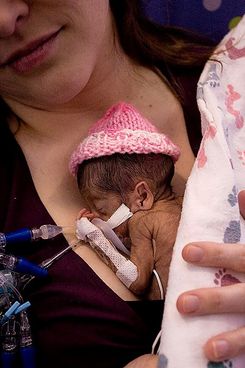
Juniper French was born in 2011. Her mother, Kelley Benham French, was just 23 weeks pregnant with her at the time. Juniper was born so early that almost nothing about her was finished: She weighed just one pound, four ounces, her eyes were fused shut, her skin translucent. She wasn’t ready to be born, and yet, here she was, on what is known as the “edge of viability” — one of the babies born so early that their very existence is controversial. Should we try to save them? Twenty years ago, the answer was always “no.” Even today, a baby born before 22 weeks is almost always allowed to die, and considered a miscarriage. But Juniper lived.
Kelley and Tom French were both respected journalists before their daughter was born. They both worked at the Tampa Bay Times, where Tom won a Pulitzer and where Kelley published a 20,000-word piece on her experience having Juniper, “Never Let Go,” which became a Pulitzer finalist. Juniper: The Girl Who Was Born Too Soon expands that story to book-length, with both parents as authors. Because they were journalists before they were parents to what many would call a “miracle baby,” the Frenches bring an unflinching, exceedingly painful clarity to a story of already excruciating anxiety. In the background, of course, is the reader’s knowledge of the most important truth of the story: Juniper is okay. She is healthy. She is happy. And the story of her birth, four months early, is told with love and brutal honesty, by her parents.
Have you written about yourself before?
Kelley Benham French: Never. Not only had I never written about myself, but I firmly never wanted to write about myself. I’m just not a sharer like that. I did not post about my pregnancy on Facebook. A lot of the things that are in the book about the IVF and the egg donor are things that almost nobody in my family knew about until they read it in the paper.
The book is a very beautiful thing to do for your daughter because she’s always going to have it.
KBF: That was a big motivator for me. I certainly felt a journalistic responsibility to do the story. For a lot of reasons, I also felt responsibility to my daughter to capture it for her. I might have written a little bit differently if she were the only audience. I might have left some stuff out about what a disaster I was in the early days.

Do you have any fear or worry or guilt about writing about her? She is almost more public property because people want to see pictures of her. They want to talk about her. They want to ask how she is.
KBF: I feel conflicted about it. I hope that this gets a lot of attention for a short period of time. Most of the story happens before she comes home from the hospital. There’s actually very little in it about her now.
There’s so little about your story that is “Oh, I can relate to this …” because so many things about it are fantastic, but one thing you write about is feeling like a failure. Your failure to produce enough breast milk, or to keep the baby inside of your body long enough. You said that you felt like you were failing your husband and you were failing the baby. That, I think, is a universal motherhood experience.
KBF: We beat each other up. It’s not made any easier by all the mom groups I belong to. There is just this crazy competitive, judgmental mommying culture that we’re all a part of. You read that if you cut the cord too early you’ll never bond with your baby. If you feed formula your baby will grow up stupid.
Because of how Juniper was born, and because she seemed like she belonged to so many people — she lived in a hospital where you couldn’t be the only caretakers, you couldn’t keep her alive alone. And it was that way for a long time — for months. How does that change how you feel about her and about your life together?
Tom French: I’ve got two sons in their mid-20s. What you know as you watch your children grow up is they’ve got a huge number of people who play such an incredible role. In my sons’ lives and in Juniper’s life, we’ve been really lucky. A lot of people have really helped them, all three of them.
One of the odd side effects of Juniper being born so early was that I had a close relationship with her at a time when fathers don’t. Kelley was always very brutally self-aware of what was happening and I was deluding myself sometimes, but the odd effect of my delusion was that it allowed me to be present. It was my protection. It allowed me to be standing there holding her hand. There were long stretches in those first weeks especially when Kelley was really, really working hard with her depression and her grief, and I had a role that was more central than I would normally have expected. I can’t deny that I really loved that. It was a gratifying thing that she needed me and that I could be there.
You spent a lot of time reading to Juniper in the hospital. You read all of the Harry Potter books to her.
TF: It’s so strange, because she doesn’t remember any of it. Those were some of the best hours of my life. She allowed me to help her in the only way that I knew how in that setting. It helped me probably more than it helped her, just to give me something to hold onto. Once I got past my initial strange denial and really understood where we were, I just felt if this was going to be her last day or her last hour, then we were going to spend it together in the best way we could. We were going to have a good day.
It’s like being face-to-face with the reality that you can’t really face. I felt this way when my daughter was born. I felt so in-tune for a minute. You don’t feel that way many times in your life.
TF: You’re not allowed to.
LBF: Right. You would be an uncomfortable person to be around.
TF: Yeah. You would make people really nervous. That was actually the key for me: just trying not to be so afraid all the time. I realized how stupid that was and how my fear was leading me to be careless and hurtful. That was hard, and I had to examine that and do something about that. That was the big change, and from then I felt like a different person.
You mention that during your pregnancy, and then after your daughter was born, you would sometimes Google things, looking for answers. I give you credit for doing it in these circumstances, but I think there’s always a price to being this realistic with yourself.
KBF: I did Google, and I found it to be not helpful for two reasons. One, a lot of the statistics that I found were either outdated or from another country where outcomes are very different. I didn’t know how outdated they were or I didn’t have the context to put them in. I read many terrifying things on the internet. I also read some of these false hope stories, like these miracle babies.
There was a time when we didn’t have a lot of reason to have hope. Now that I’m out the other side of it and I’ve studied as a journalist, I know that there is actually a great deal of hope. Not in my singular, personal anecdote about my miracle baby, but in the studies and in the research. Those studies and that research was not available to me when I was making the decision and I wish it had been. Doctors, when they’re giving you their 20-minute spiel, they don’t have access to all of that information, some of them. Most of the time they go through the list of calamities so that they can make sure that that they have covered everything to protect themselves and protect the hospital. You can’t even absorb a list of 30 calamities. Give me the ones I need to know. Asthma? I don’t care about asthma right now. I’m not too concerned that she might have asthma. I’ll totally take blindness, please give me blindness. Tell me about the really bad stuff that might make me want to let my baby die in the morning. The odds of those things happening are actually quite small. The statistics they gave me, 80 percent chance of death or disability, that’s not a useful statistic because if we don’t resuscitate her she’s 100 percent dead.
I wish I had known that if we treat her and she survives, there’s a 50 percent chance that she’s going to be perfectly fine. In the other 50 percent there is this huge spectrum, from minor problems to really bad things happening. Most preemies that leave the hospital with very serious disabilities do so because the parent had another chance to make a choice not to switch off support. I don’t have 100 babies. I have one baby. So statistics don’t matter until they’re about you.
What kind of life she has is the most important thing. There was never a point, never a point where she didn’t have the opportunity to have a great life. Our culture is turning its own corner in how we view kids that have disabilities. Now kids with Down syndrome have many more opportunities and are viewed differently and are treated differently. We don’t even know what their potential is. We’re just starting to explore it. Were just starting to give them a fair shot.
What was going home like? Was it really terrifying? Was it a huge relief?
KBF: It was all those things. As the months went on, I became part of the hospital and that place became a part of me. In some ways, I was the center of the baby’s world, but mostly I wasn’t.
When we left the hospital and Juniper’s nurse Tracy was walking out with us, I said, “She won’t know which one of us is her mom until we get to the car.” There was truth to that. Who spent more time with her? Tracy or me? It was probably pretty close.
I had all these questions about in what way am I her mother? I didn’t feel jealousy or anything like that, I just felt like I had had this team of experts and of mothers and fathers and just this team of support. I was terrified to leave that behind. On the other hand, once we got her home she just took off. The difference in her was immediate. She rolled over in her crib the first day. It’s like she was outgrowing the hospital. She’d been in one room. She had never been outside. She had never seen the sun. She had never felt the grass or the wind. She had never had her face licked by the dog. She was five and a half months old, she weighed just over eight pounds. So she looked sort of like a newborn, but she’d been alive a long time. She could do a push-up in her incubator well before she was supposed to be born.




